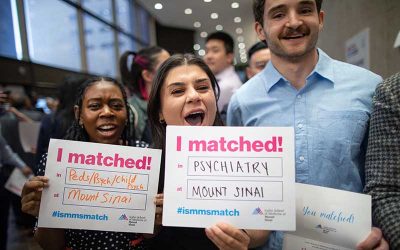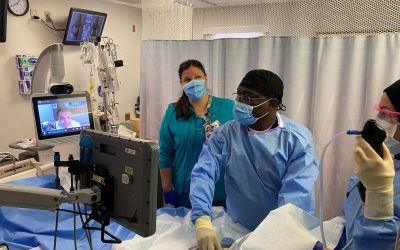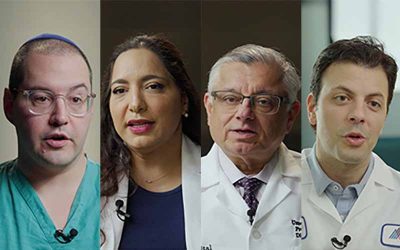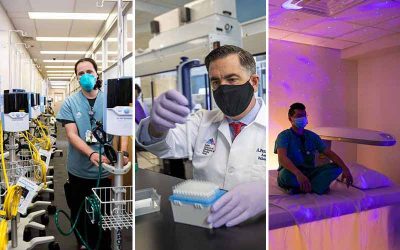Oct 26, 2018 | MSBI, Uncategorized
Last week was all about celebrating our amazing people at MSBI.
Every year, we honor several of our colleagues with the Wholeness of Life and Care and Compassion Awards. The winners and nominees are recognized for:
- Demonstrating respect for human beings as whole persons
- Embodying an exceptional concern for patients and their families, marked by compassion, kindness, and attentiveness
- Showing a commitment to improving patient satisfaction and the patient experience
- Modeling teamwork, dedication, energy, and hope
The ceremony last week touched my heart in so many ways. To hear you all speak about each other with such respect and adoration is inspiring. Care and Compassion award winner Andrew Bingham, a counselor in one of our opioid treatment program clinics, shared with his team, “Love started the day I met you guys. Love means Listen, Overcome, Value, Endure.”
Our 2018 winners include:
- Wholeness of Life Winner: Junior Corniel, RT(R), Lead X-Ray Tech, Petrie Campus
- Care & Compassion Winners: Romina Arceo, NP, Pain Management, Petrie Campus; Andrew Bingham, CASAC, 25th Street OTP Clinic
Oct 5, 2018 | MSBI, Uncategorized
Last week was exciting and busy for our colleagues who treat patients with substance abuse disorders.
On Tuesday, we shared with many of you that our addiction services programs, including Stuyvesant Square (aka Stuy Square) and our opioid treatment programs, will now be known as the Addiction Institute of Mount Sinai (AIMS). We will continue to offer the services we currently provide. We will also collaborate with other leading research programs across Mount Sinai Health System. The programs are already be partnering with AIMS through trials and studies that will ultimately benefit our patients.
It was wonderful to see so many of our addiction services teams connect on Tuesday. You will begin to see some changes in our signage and the way we promote the program in the community.
September is also National Recovery Month. Our opioid treatment program employees found surprising and engaging ways to help our patients express their feelings about recovery. On Wednesday, we held a special event where patients at each of our locations shared skits, music, poetry, artwork, and other expressions to celebrate the recovery process. Cheryl Marius, OTP clinic director, said the overwhelming theme was positivity. Our counselors work with patients to turn a difficult challenge into inspiring change. Recovery Month is a national celebration, and one of our patients won second place in the Recovery Month art contest.
I’m thankful that we can lift these patients up and celebrate their recovery journey.
Updated on Jun 30, 2022 | MSBI, Uncategorized
The Phillips School of Nursing at Mount Sinai Beth Israel has earned the National League of Nursing’s prestigious designation as a “Center of Excellence in Nursing Education™ for the years 2018-2022. This is the School’s second consecutive designation as a Center of Excellence in the category of “Enhancing Student Learning and Professional Development.” Phillips School of Nursing was one of just 12 schools selected nationwide to receive the honor in that category this year.
Under the leadership of Dr. Todd F. Ambrosia, Dean, a series of new initiatives have been developed that enhance student learning in critical thinking and evidence-based practice.
The New York City-based National League of Nursing invites schools to apply for Center of Excellence status based on their demonstrated sustained excellence in faculty development, nursing education research, or student learning and professional development. Schools must also have a proven commitment to continuous quality improvement. The designation is designed to acknowledge those schools of nursing and health care organizations that have achieved a level of excellence in a specific area. Through public recognition and distinction, the program acknowledges the outstanding innovations, commitment, and sustainability of excellence these organizations convey.
“We are honored to receive this recognition from the NLN,” said Dr. Todd F. Ambrosia, Dean. “I’m extremely proud of the faculty, staff and students as we continue the legacy of excellence this educational institution established over 114 years ago.”

Students from the Phillips School of Nursing at Mount Sinai Beth Israel pose during their white coat ceremony. The school offers an Accelerated Associate in Applied Science Degree in Nursing, an Accelerated Bachelors of Science in Nursing, a RN to BSN completion program.
Updated on Jun 30, 2022 | MSBI, Uncategorized
I am delighted to report that, once again, Mount Sinai Beth Israel has won a host of awards for stroke, heart attack, and heart failure care. Here are our awards for 2017:
- Mission: Lifeline® Gold Receiving Quality Achievement Award in STEMI
- American Heart Association/American Stroke Association’s Get With The Guidelines®-Stroke Gold Plus Quality Achievement Award and Target: Stroke Elite Plus
- American Heart Association/American Stroke Association’s Get With The Guidelines®-Heart Failure Gold Plus Quality Achievement Award and Target: Heart Failure Honor Roll
What impresses me most is the exceptional interdisciplinary teamwork that leads to these outcomes.
In the community, Emergency Medical Technicians and Medics do an incredible job of providing initial assessment and care and getting patients to us quickly and safely.
All of the employees in the Emergency Department play a key role in triaging and treating patients while notifying the teams for our Cardiac Catheterization Lab, Cardiology, Telemetry, and others that patients are coming their way.
These units then provide quick and specialized care for these patients and help see them through to recovery frequently in partnership with our inpatient teams.
Suchin Lin, RN is a heart failure champion on 8 Silver, pictured with Nurse Manager, Ellen Brady, RN.
Many more on our 8 Silver team who take care of our heart failure patients.
Sharon Alexander-Pierre, RN and Fern Caruthes, RN are also heart failure champions on 8 Silver. Here is Sharon Alexander-Pierre, RN with Maria Vallejo, RN, and Ivane Jean Charles, RN.
Here is our team of pharmacists who focus on heart failure patients: Jessica Wong, Alissa Hui, April Castillo, Tram Thai.
A few members of our STEMI team: Theresa Reynes, RN; Kathleen Kearney, NP; Stephanie Freeo, RN; John Fox, MD; Mary Cronin, RN.
A few more members of our STEMI team: Ramesh Gowda, MD; Nezir Durakovic, CVT; Yumiko Kanei, MD; Glenn Tac-An, CVT; Lena Chang, Director of Nursing; Kathleen Kearney, NP; Hugo Rosero, MD; Rufus Nagbe, CVT.
Members of our stroke team: Arash Yousefi, MD; Christina Marsh, MD; Cristina Schreckinger, MD; Lili Velickovic Ostojic, MD; Nick Lemus Esquival, MD; Terrance Tian, MD; Front row: Nikita Urval, MD; Clover Youn, MD. Not pictured are some of our Stroke Care team members Irene Boniece, MD, Kristine Ortiz, MD, and Myrna Skiut, MD.
The care does not stop there. The patients leave the hospital with a plan that includes follow-up appointments and phone calls, and other guidelines so they can continue their recovery.
I’d also like to give thanks to Monique Bell who helps us track every patient who comes through our doors and ensures that the American Heart Association gets our data.
Through this journey, our patients remain safe, and this is because of the dedication of so many of you.

Monique Bell, coordinator for these programs
May 15, 2018 | MSBI, Uncategorized

Rose Otero, RN-BC, Nurse Education Manager, with Louboutina
We invite all nurses at Mount Sinai Beth Israel, Mount Sinai Union Square, The Blavatnik Family—Chelsea Medical Center of Mount Sinai, and our many Opioid Treatment Programs and Doctors locations to take the 2018 Mount Sinai Press Ganey Nursing Engagement Survey between Monday, May 14 and Tuesday, June 05, 2018. The survey will measure seven nursing satisfaction categories that will inform leaders on our progress in creating ideal practice environments for our nurses:
- Autonomy
- Professional Development
- Leadership Access and Responsiveness
- Inter-Professional Relationships
- Fundamentals of Quality Nursing Care
- Adequacy of Resources and Staffing
- RN-to-RN Teamwork and Collaboration
Please look for a link in your Mount Sinai e-mail to complete the survey. Your response is confidential.

New York City’s Hugging Dog, Louboutina
On Monday, May 14, Louboutina, the celebrity “hugging” dog visited the 2 Dazian Rotunda to kick off the 2018 Mount Sinai Press Ganey Nursing Engagement Survey. “Loubie” came engaged and dressed for matrimony. Follow @Louboutinanyc and her owner, Mount Sinai Beth Israel language and interpreter services coordinator, Cesar Fernandez-Chavez, on Instagram.

Rose Otero, RN-BC, Nurse Education Manager, and Cesar Fernandez-Chavez, Language and Interpreter Coordinator with his dog, Louboutina.

Rose Otero, RN-BC, Nurse Education Manager, with Louboutina














































